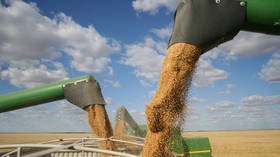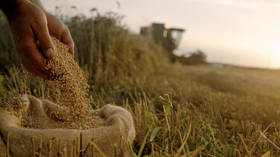
Kiev also plans to add new ports to the agreement

© Getty Images / Lightguard
Ukraine plans to push for an extension of the UN-brokered Black Sea Grain Initiative for at least one more year, Reuters reported on Wednesday, citing Yury Vaskov, the country’s deputy minister of infrastructure.
The UN-backed agreement, which was reached last July between Ukraine, Russia, and Türkiye, allowed shipments of wheat and other agricultural products interrupted by the conflict with Russia to resume.
According to Vaskov, Kiev will also seek approval to have new ports come under the scope of the agreement. Currently, the deal covers three Ukrainian ports: Odessa, Chernomorsk, and Yuzhny. Together, they export about 3 million tons a month, but the addition of the ports of Nikolaev could add an additional 2 million to this capacity, Vaskov said.
“A formal proposal will come from us this week on the need to work on an extension… We will request… to extend it not for 120 days but for at least one year because the Ukrainian and global agricultural market needs to be able to plan these volumes (of exports) in the long term,” the official noted in an interview to Reuters. He added that Kiev would also demand an increase in the number of cargo inspection teams “in order to eliminate the accumulation of vessels waiting for inspection.”
The parties to the deal are expected to start talks on an extension later this week, but the exact date has not yet been set. The initial 120-day agreement has already been already extended once, in November, and is to expire on March 18 unless an extension is agreed.

Russia, meanwhile, has repeatedly stated that it is unhappy with how the grain deal is being implemented. Under the agreement, the UN was expected to help Russia resume its own grain shipments via the Black Sea, which, although not directly targeted by Western sanctions, have faced problems due to the restrictions.
Russia’s ambassador to the UN said last month that Moscow has not been able to export any grain as part of the agreement. On the other hand, Russia has criticized the deal because the bulk of the grain sent out of Ukraine has been going not to poorer countries, as had been agreed, but to Western Europe.
For more stories on economy & finance visit RT’s business section




